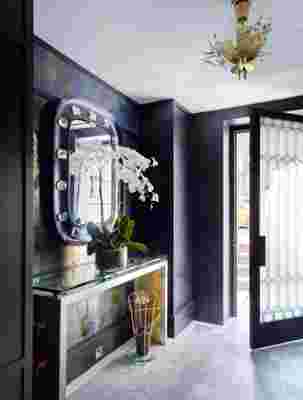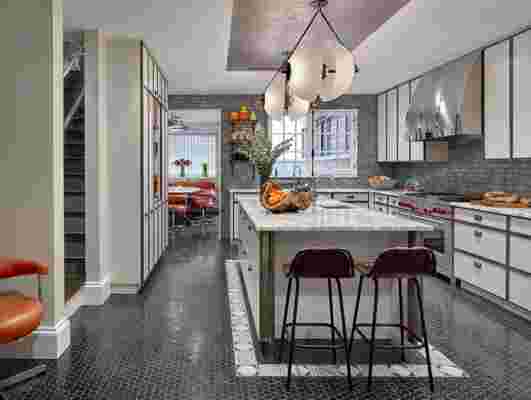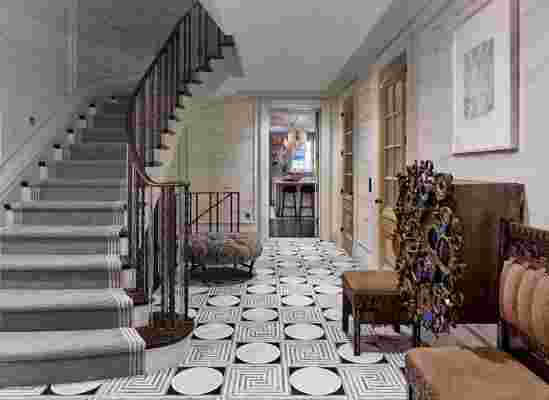Judging from its immaculate interiors today, it’s difficult to imagine this Fox-Nahem-designed Upper East Side townhouse as anything but most New Yorkers’ dream home. The seven-story Greek Revival manse, however, was formerly divided into choppy apartments and is basically unrecognizable in its current single-family-home setup today.
“Oh my God, it was disgusting,” says AD100 designer Joe Nahem of Fox-Nahem Design with a laugh. “There was just a façade for landmarks; nothing else. Not the floor, not the beams; nothing remained.” Along with architect and frequent collaborator Jose Ramirez, Nahem stripped the townhouse down to its shell; even the ceiling heights were changed during the 30-month renovation. “Prior to hiring his team [for interior design], they already had so much input in adjusting the general layout,” says the homeowner (who wishes to remain anonymous) about working with Nahem. “They gave us a much more practical flow, which made us so excited.”

The entry’s walls were livened up by installing back-painted tempered glass from the Alchemy "Atlantis” collection (purchased through Sublime). Above hangs a delicate Paavo Tynell chandelier ca. 1950.
Such an elongated renovation, while obviously time-consuming, did afford Nahem the luxury to scour the globe for décor. He and his team sourced items at auction from around the U.S., Europe, and Asia. Many other focal points, like the asymmetrical bed in the master bedroom and the dusty pink couch in the living room, were bespoke pieces, making the interior design truly unparalleled. “Looking back on working with Joe, it was more of an education,” says the homeowner. “He taught me so much about different designers and eras, how to curate and collect vintage, and the joys of bidding at auctions.”
Nahem is quick to point out, however, that the homeowners were instrumental in the finished vision of the home. “They weren’t the type of clients who just handed you the keys and said, ‘Let us know how much and get it done,’” he says, looking back. “It was definitely a collaborative effort and I actually learned a lot.” The owners, rather than having a specific design style they wanted the home to embody, focused more on the purpose of each of the rooms. “It seemed to me there was more an overall program of their lifestyle,” Nahem says.

The homeowners love to entertain, so a kitchen fit for a professional chef was mandatory. Pendants from Apparatus Studio bring a touch of softness to the otherwise utilitarian space.
Take, for example, the dining room, whose two tables could be set up for intimate dinners of six, or joined together for a massive dinner party. “That room was designed [that way] because it’s nothing for them to have 20 or 30 people for a holiday dinner,” he says. “But, at the same time, they can also just have friends or family over.” The custom floral plasterwork, designed by Matthew Solomon and purchased through Maison Gerard, adds a flourish to the ceiling that is equal parts inviting and elevated. “When Joe approached us with the idea we thought, ‘This man is crazy,’” says the homeowner of the plasterwork. “All he kept saying was ‘Just trust me,’ and trust we did. It’s without a doubt the most incredible aspect of the house and gives you the wow factor when you enter the room.”
The homeowners describe their design goal as “timeless New York style with an eclectic edge,” which is evident not only in the dining room but in nearly every space in the home. No area encapsulates this more, though, than the main hall. While traditional elements abound, like the sweeping staircase and the subtle hand-painted wallpaper, a closer look reveals whimsical details. The balusters, for one, are alternating iron and glass. “They wanted a beautiful, elegant stair railing, but they didn't just want another one of those typical townhouse railings,” says Nahem. And it’s hard to miss James Bearden’s “Moon Pool” wall cabinet: With its blue and gold concentric circle design, it does indeed resemble something from outer space.
Nahem has extensive experience designing townhouses, which, with their immense size relative to other New York spaces, can be incredibly fulfilling projects for any designer. But even he will admit to one challenge: “The verticality of living space,” he says. “How do you really get people to use these floors? I've seen people live in 13,000-square-foot houses and basically use two rooms for 95% of the time,” he says. But in this home, “every floor has a way of bringing somebody into it.”

